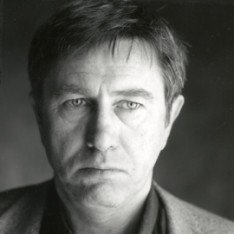Jerzy Radziwiłowicz - NOSPR
Jerzy RadziwiłowiczNarrator

Born in 1950, Jerzy Radziwiłowicz is a theatrical, television and film actor, a professor at the National Academy of Theatre in Kraków and a translator.
He graduated from the Faculty of Acting of the National Academy of Theatre in Warsaw. He debuted in 1972 on the stage of the Old Theatre (Stary Teatr) in Kraków as Zagórski in Michail Szatarov’s Bolsheviks directed by Andrzej Przybylski. One year later he already played in Adam Mickiewicz’s Forefather’s Eve directed by Konrad Swinarski, a staging, which became part of the canon of Polish theatre. Swinarski also hired Radziwiłowicz for Liberation / Wyzwolenie and for the television version of Wyspiański’s The Judges / Sędziowie. He also began rehearsals for Shakespeare’s Hamlet, where he was supposed to play the main role, but the staging never took place because of the sudden death of the director.
Jerzy Radziwiłowicz was lucky to meet in his theatrical and film career the most outstanding Polish directors and actors. Already in 1973, he started collaborating with Jerzy Jarocki at the staging of Franz Kafka’s Trial. He collaborated with Jarocki among others at the stagings of Anton Czechov’s Cherry Orchard (1975), Gogol’s Controller (1980), Thomas S. Eliot’s Murder in the Cathedral (1982), Calderon de la Barco’s Life Is a Dream (1983), Mrożek’s Portrait (1988), the breakthrough and canon staging of Gombrowicz’s Wedding (1991) and the first Polish staging of Johann Wolfgang Goethe’s Faust (1997).
In 1977 he was noticed by Jerzy Grzegorzewski who trusted him with the role of the groom in Stanislaw Wyspiański’s Wedding Party / Wesele. Eighteen years later Radziwiłowicz played in another version of Mickiewicz’s drama, this time it was Grzegorzewski’s staging of Forefather’s Eve, 12 Improvisations / 12 Improwizacji. Inspired by Grzegorzewski, Radziwilowicz prepared in 1996 a new translation of Moliere’s Don Juan.
In the 1970s Radziwiłowicz began a long and close collaboration with Andrzej Wajda, both in film and in theatre. He played, among others, Mishkin in Nastasia Filipovna based on Dostoyevsky’s Idiot. He played in the internationally awarded Man of Marble (1976) and Man of Iron (1981), films, which became symbols of the reckoning of the times of Stalinism and of a prediction of liberty changes. ‘The beauty of this exceptional film lies in the complexity of the director’s relations to Birkut, this perfectly humble representative of the whole unhappy and alienated epoch’, wrote in 1979 Alberto Moravia about Birkut, the role played by Radziwilowicz in Man of Marble.
Four years later Radziwiłowicz plays in another of Wajda’s masterpieces, in theatre this time: Crime and Punishment basing of Fiodor Dostoyevsky.
‘A perfectionist actor, gifted with intelligence and deep sensitivity’: this is how Maciej Karpinski described Radziwilowicz in his book Andrzej Wajda’s Theatre. Truly, Radziwilowicz’s acting reveals an important influence of Jerzy Jarocki’s school, which he also uses in films: Kieślowski’s Endless / Bez Końca (1984), Stanisław Różewicz’s Door in the Wall / Drzwi w Murze (1973), Jean-Luc Godard’s Passion (1982), on the most important Polish stages: the Stary Theatre in Kraków, the National Theatre (Teatr Narodowy) in Warsaw as well as the French theatre Comédie de Saint-Etienne.
Radziwiłowicz created even more important roles in Jerzy Grzegorzewski’s plays. In Warsaw’s National Theatre he played Pankracy in Zygmunt Krasiński’s The Un-Divine Comedy (2002) and Kaliban in the great mise-en-scene of W.H. Auden’s poem The Sea and the Mirror (2003).
For the role of Kaliban, he received the Aleksander Zelwerowicz Award. In Grzegorzewski’s last, moving play On: Drugi powrót Odysa / He: The Second Return of Odysseus (2005) Radziwiłowicz played the leading part. He precisely, profoundly, and yet ironically leads the audience through the path of this treaty about passing away.
In the National Theatre, he also played Pozzo in Samuel Beckett’s Waiting for Godot directed by Antoni Libera (2006) and the title role in Shakespeare’s Othello, directed by Agnieszka Olsten (2008). Sprawa / The Case (2011), based on Słowacki’s Samuel Zborowski – the last play directed by Jerzy Jarocki – was also a big artistic event. Radziwiłowicz played also in stagings of Kordian (2015) and Witkiewicz’s The Anonymous Work (2013), both directed by Jan Englert. He often collaborates on stage with another star of the theatre, Mariusz Bonaszewski, with whom he created interesting duets in plays such as Ephraim Lessing’s Nathan the Wise directed by Natalia Korczakowska (2012) and Władimir Sorokin’s Ice directed by Bogołomow Konstantin (2013).
Quite unexpectedly, a parallel world opened for Radziwiłowicz on television. Surprising was his role in the crime TV series Glina / Cop directed by Władysław Pasikowski. The actor said he was happy to play a tough guy, possibly for the first time in his career. He also created a great, discrete role of a psychotherapist in the Polish version of the Israeli format Bez Tajemnic / In Treatment, directed by Anna Kazejak, Jacek Borcuch and Marek Lechki. On the big screen, he appeared in Pasikowski’s Aftermath and Wajda’s Wałęsa: Man of Hope.



